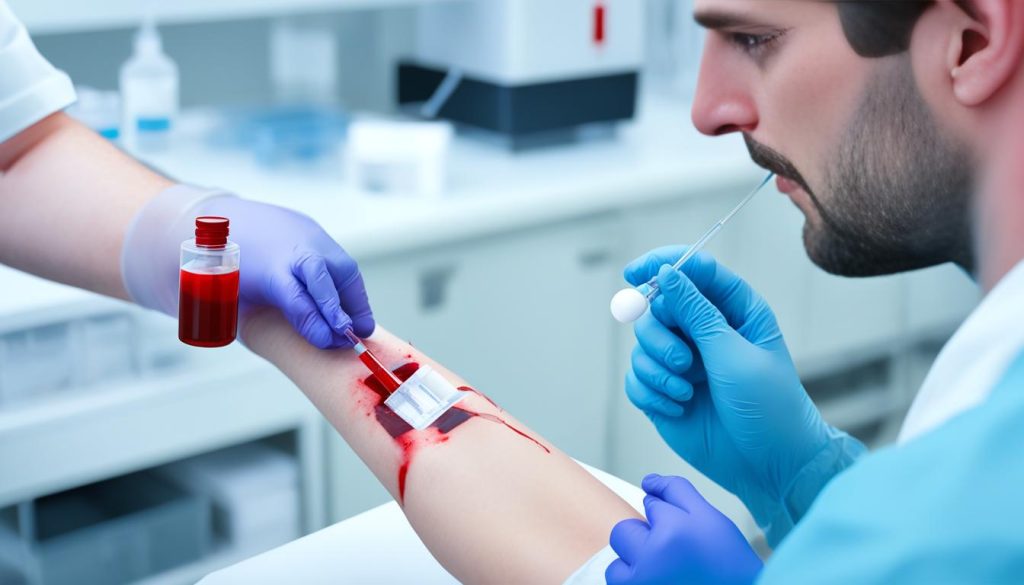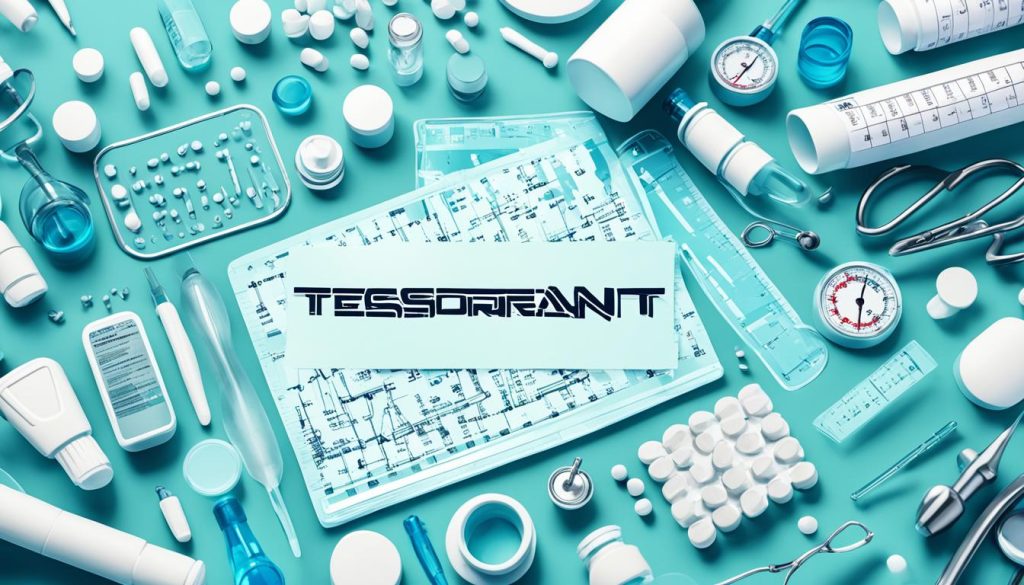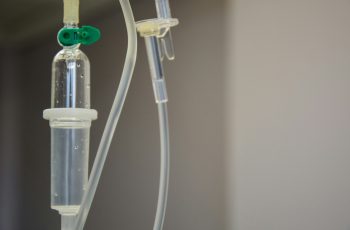Ad Blocker Detected
Our website is made possible by displaying online advertisements to our visitors. Please consider supporting us by disabling your ad blocker.
As you reach age 45, you may start to notice changes in your body and overall well-being. One factor that can contribute to these changes is your testosterone levels. Testosterone is a hormone that plays a crucial role in several aspects of men’s health, including energy levels, sex drive, and mood.
Low testosterone levels can lead to a range of symptoms, such as decreased libido, fatigue, muscle loss, and difficulty concentrating. If you are experiencing these symptoms, you may be wondering if testosterone therapy is right for you.
It is important to note that not all men with low testosterone levels need treatment. Low testosterone levels by themselves may not cause any issues and may not require intervention. However, for those who have symptoms that significantly impact their quality of life and have confirmed low testosterone levels, testosterone replacement therapy can be considered.
Before considering testosterone therapy, it is essential to consult with a doctor who specializes in men’s health. They will evaluate your symptoms, conduct blood tests to measure your testosterone levels accurately, and determine if testosterone therapy is an appropriate option for you.
It is also crucial to understand that testosterone therapy, like any medical treatment, comes with potential risks and side effects. Long-term risks and benefits are still not fully understood, so careful consideration and regular monitoring are essential throughout the treatment process.
Key Takeaways:
- Low testosterone levels can contribute to symptoms such as decreased libido, fatigue, and muscle loss.
- Not all men with low testosterone levels require treatment.
- Consulting with a healthcare professional is crucial to determine if testosterone therapy is appropriate for you.
- Testosterone therapy comes with potential risks and side effects.
- Regular monitoring is necessary to ensure the appropriate use of testosterone therapy.
Symptoms of Low Testosterone in Men
Low testosterone levels in men can have a range of symptoms, which may vary from person to person. It is important to recognize these symptoms as they can significantly impact a man’s quality of life. If you are experiencing any of the following symptoms, it may be a sign of low testosterone:
- Low sex drive (libido): A decrease in sexual desire or interest in sexual activity.
- Erectile dysfunction: Difficulty achieving or maintaining an erection during sexual activity.
- Fatigue and poor energy level: Feeling tired and lacking energy, even after getting enough rest.
- Decrease in lean muscle mass: Loss of muscle mass and strength, leading to a decrease in physical performance.
- Body and facial hair loss: Thinning or loss of hair on the body and face.
- Difficulty concentrating: Trouble focusing or paying attention to tasks.
- Depression: Persistent feelings of sadness, hopelessness, and a loss of interest in activities.
- Irritability: Increased irritability and mood swings.
- Low sense of well-being: Feeling generally unwell, lacking vitality, and a decreased sense of enjoyment in life.
- Low sperm count: Reduced fertility and difficulty conceiving.
- Increase in body fat: Accumulation of excess body fat, particularly around the abdomen.
These symptoms can be subtle and may also be related to other conditions, so it is important to consult with a healthcare professional for a proper diagnosis.
If you are experiencing any of these symptoms and suspect that low testosterone levels may be the cause, it is recommended to consult with your doctor. A comprehensive evaluation, including blood tests, can help determine if testosterone replacement therapy is necessary for you. Your doctor will consider your symptoms, testosterone levels, and overall health to determine the best course of action.
Determining Testosterone Levels
To assess your testosterone levels, your doctor may recommend a blood test. This simple and effective diagnostic tool provides valuable insights into your hormonal profile. For accurate results, it is advisable to schedule the test in the morning when testosterone levels are typically at their highest.
Testosterone levels can fluctuate throughout the day, so it may be necessary to conduct additional tests at different times to obtain a comprehensive view of your hormone levels. The normal range for testosterone in men typically falls between 300 to 1,000 ng/dL (nanograms per deciliter).
However, it is important to remember that individual symptoms and responses to testosterone can vary. Your doctor will interpret your results in the context of your unique clinical picture, taking into account factors such as age, overall health, and specific symptoms.
To further illustrate the range of testosterone levels and their interpretation, the table below provides a general guideline for understanding testosterone levels in men:
| Testosterone Level (ng/dL) | Interpretation |
|---|---|
| Below 300 | Low testosterone |
| 300-1,000 | Normal testosterone |
| Above 1,000 | High testosterone |
It is essential to discuss your testosterone levels and their implications with your healthcare provider. They will help you understand the significance of your results and guide you in making informed decisions regarding your testosterone levels and overall health.

Remember, determining your testosterone levels through a blood test is a crucial step in evaluating your hormonal health. It provides valuable information that can guide treatment decisions and help optimize your overall well-being.
Testosterone Replacement Therapy Options
When it comes to testosterone replacement therapy, there are several options available for men with low testosterone levels. These options include:
- Skin Patches: These patches are applied daily to the arm or upper body. They slowly release testosterone into the bloodstream over time.
- Gels: Gels can be applied topically to the skin or inside the nose. They are absorbed into the body and help increase testosterone levels.
- Mouth Patches: These are tablets that stick to the upper gums and are applied twice a day. They slowly dissolve and release testosterone.
- Injections: Injections are administered into the muscles. They provide a quick boost of testosterone and are usually given every 1 to 2 weeks.
- Implants: Implants are pellets inserted into soft tissues. They slowly release testosterone over a period of 3 to 6 months.
Each method of testosterone replacement therapy has its own advantages and considerations. The choice of therapy depends on factors such as personal preference, convenience, and individual response to treatment. It is important to consult with a healthcare professional to determine the most suitable option for you.

Note: This image is for illustrative purposes only and does not represent an endorsement of any specific brand or product.
Benefits and Risks of Testosterone Therapy
Testosterone replacement therapy (TRT) offers several benefits for men with low testosterone levels. It can help improve energy levels, enhance sex drive, promote quality erections, increase bone density, build muscle mass, and enhance insulin sensitivity. Additionally, TRT has shown positive effects on mood and cognitive function.
However, it is important to consider the potential side effects and risks associated with testosterone therapy. These may include:
- Skin irritation at the application site
- Increased risk of blood clots
- Worsening of prostate conditions
- Sleep apnea
- Potential unknown long-term risks
Regular monitoring and consultation with a doctor are crucial to manage these risks effectively. Monitoring testosterone levels and overall health can help identify any adverse effects and adjust the treatment accordingly.
| Benefits | Risks |
|---|---|
| Improved energy levels | Skin irritation at the application site |
| Enhanced sex drive | Increased risk of blood clots |
| Promoted quality erections | Worsening of prostate conditions |
| Increased bone density | Sleep apnea |
| Build muscle mass | Potential unknown long-term risks |
| Enhanced insulin sensitivity | |
| Positive effects on mood and cognitive function |
It is important to weigh the potential benefits against the risks and individual circumstances when considering testosterone therapy. Consulting with a knowledgeable healthcare professional is essential to make informed decisions about TRT.
Expert Insight:
“Testosterone therapy can provide significant benefits for men with low testosterone levels; however, it’s crucial to carefully monitor and manage any potential risks. Regular consultation with a doctor is necessary to ensure the safe and effective use of TRT.”
– Dr. Lisa Thompson, Endocrinologist

Testosterone Therapy in Older Men
As men age, it is natural for their testosterone levels to decrease. In fact, about 4 out of 10 men over 45 have low testosterone levels. This decline in testosterone can result in various symptoms, some of which may overlap with other age-related conditions.
For older men experiencing low testosterone, testosterone therapy can offer several potential benefits. One notable improvement that can occur with testosterone therapy is an increase in physical function. This can manifest as improvements in muscle strength, bone mineral density, and overall quality of life.
However, it is important to approach testosterone therapy in older men on an individual basis, considering the potential benefits and risks. Each person’s health profile and circumstances may differ, and the decision to undergo testosterone therapy should be made in consultation with a healthcare professional.
It is worth noting that testosterone therapy is not the only option available for older men looking for ways to increase their testosterone levels. There are also natural alternatives that can be explored. These include lifestyle changes such as regular exercise, a healthy diet rich in essential nutrients, stress reduction techniques, and adequate sleep. It is advisable to discuss these natural approaches with a healthcare professional to determine their suitability and effectiveness for each individual.
Overall, whether choosing testosterone therapy or exploring natural solutions, the goal is to address the symptoms of low testosterone in older men and enhance their overall well-being and vitality.
Studies and Research on Testosterone Therapy
Research on testosterone therapy in older men is continuously evolving as scientists strive to understand its long-term benefits and risks. Numerous studies have been conducted to explore the effects of testosterone replacement therapy on muscle strength and cognitive function in older men.
These studies have produced varying results, highlighting the complexity of this field. Factors such as dosage, duration of treatment, and the specific target population can significantly influence the outcomes of testosterone therapy research. Each study brings us closer to comprehending the potential advantages and disadvantages of this treatment.
“As we delve deeper into testosterone replacement therapy studies, we uncover valuable insights into its impact on muscle strength and cognitive function in older men.”
It is essential to emphasize that testosterone therapy is not recommended for the general population of older men. Instead, it should be carefully evaluated on an individual basis, considering the unique circumstances, medical history, and overall health of each patient.
Testosterone Therapy Research Findings
Here are some key findings from recent testosterone replacement therapy studies:
- Improvements in muscle strength: Several studies have shown that testosterone therapy can lead to an increase in muscle mass and strength in older men with low testosterone levels.
- Effects on cognitive function: Research has indicated that testosterone replacement therapy may have a positive impact on cognitive function, including memory and attention, in older men. However, further investigation is needed to validate these findings.
- Individual response variability: It should be noted that individual responses to testosterone therapy can vary significantly. Factors such as genetics, lifestyle, and underlying health conditions may influence the outcomes of treatment.
While these findings provide valuable insights, the field of testosterone therapy research continues to evolve. Ongoing studies aim to establish a more comprehensive understanding of the potential benefits, risks, and long-term effects of this treatment in older men.
| Studies | Findings |
|---|---|
| Study 1 | Significant improvement in muscle strength observed among participants receiving testosterone therapy compared to a placebo group. |
| Study 2 | No statistically significant difference in cognitive function observed between the testosterone therapy group and the control group. |
| Study 3 | Participants with specific genetic variations demonstrated a higher response to testosterone therapy in terms of muscle strength gains. |
In conclusion, testosterone therapy research provides valuable insights into the effects of this treatment on muscle strength and cognitive function in older men. However, it is crucial to approach testosterone therapy on an individual basis and consult with a healthcare professional to determine its appropriateness based on specific circumstances and medical history.
Conclusion
Testosterone therapy can be a beneficial treatment option for men with low testosterone levels and associated symptoms. However, it is important to note that testosterone replacement therapy is not suitable for everyone. The decision to undergo testosterone therapy should be made in consultation with a healthcare professional who can assess individual symptoms, testosterone levels, and potential risks.
Regular monitoring and evaluation are crucial to ensure the appropriate use of testosterone therapy and minimize any potential adverse effects. Ongoing supervision by a healthcare professional can help optimize treatment outcomes and address any concerns that may arise.
While testosterone therapy can be effective, it is also worth considering natural alternatives to boost testosterone levels. Lifestyle modifications such as regular exercise, a balanced diet, stress management, and adequate sleep can all contribute to healthy testosterone levels. Natural supplements and herbal remedies may also be options worth exploring, although their effectiveness varies and should be discussed with a healthcare professional.
Ultimately, the goal of testosterone therapy is to alleviate symptoms and improve overall well-being. By working closely with a healthcare professional, men can make informed decisions regarding testosterone treatment tailored to their specific needs and circumstances, ensuring the best possible outcomes.
FAQ
Should a 45-year-old man take testosterone?
Testosterone therapy should only be considered for men with symptoms of low testosterone and blood levels that confirm this as the cause of symptoms. Consultation with a doctor is essential to determine if testosterone therapy is appropriate for an individual.
What are the symptoms of low testosterone in men?
Symptoms of low testosterone in men may include a low sex drive, erectile dysfunction, fatigue, decrease in lean muscle mass, body and facial hair loss, difficulty concentrating, depression, irritability, low sense of well-being, low sperm count, and an increase in body fat.
How are testosterone levels determined?
Testosterone levels can be determined through a blood test. It is recommended to have the blood test taken in the morning as testosterone levels tend to be highest at this time. Additional tests may be required at different times as testosterone levels fluctuate throughout the day.
What are the options for testosterone replacement therapy?
Testosterone replacement therapy is available in various forms such as skin patches, gels, mouth patches, injections, and implants. Each method has its own advantages and considerations.
What are the benefits and risks of testosterone therapy?
Testosterone therapy can provide benefits such as improved energy levels, sex drive, quality of erections, bone density, muscle mass, and insulin sensitivity. However, potential side effects and risks should be considered, including skin irritation, increased risk of blood clots, worsening of prostate conditions, sleep apnea, and potential unknown long-term risks.
How does testosterone therapy affect older men?
Testosterone therapy in older men can improve certain aspects of physical function, such as muscle strength, bone mineral density, and quality of life. However, the decision to undergo testosterone therapy should be made on an individual basis, taking into account the potential benefits and risks, as well as natural alternatives to increase testosterone levels.
What does research say about testosterone therapy?
Research on testosterone therapy in older men is ongoing, and there is still much to learn about its long-term benefits and risks. Studies have shown varying results in terms of the anabolic effects of testosterone replacement therapy on muscle strength and cognitive function in older men.
What is the conclusion about testosterone therapy?
Testosterone therapy can have potential benefits for men with low testosterone levels and symptoms, but it is not recommended for everyone. The decision to undergo testosterone replacement therapy should be made in consultation with a healthcare professional, considering individual symptoms, testosterone levels, and potential risks. Natural alternatives to boost testosterone levels should also be considered.
At What Age Is Testosterone Therapy Typically Recommended for Men?
Testosterone therapy is typically recommended for men who experience symptoms of low testosterone, such as decreased sex drive and fatigue, around the age of 40 or older. It’s important to consult a healthcare professional to determine the optimal timing for testosterone therapy based on individual health and symptoms.


